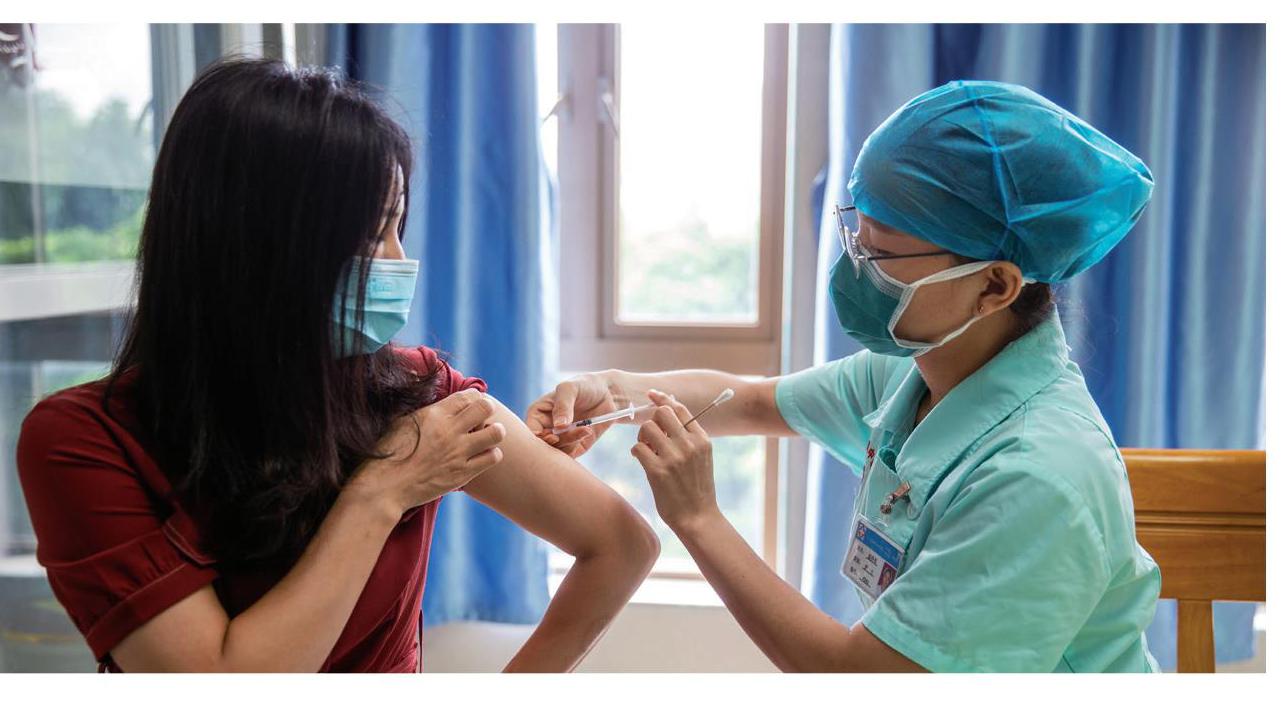China’s Other Vaccine Drive



A city in Inner Mongolia pioneers free HPV shots for thousands of women
Getting a Covid-19 vaccine in China is free, and can be as simple as walking down the street to the neighborhood clinic. But protecting against other deadly viruses is not so easy: Shots against the cancer-causing human papillomavirus (HPV), for example, can cost thousands of renminbi and involve excruciatingly long waits.
Ordos, in northern Chinas Inner Mongolia autonomous region, is trying to change that by offering free vaccines against two types of HPV to thousands of female residents aged between 13 and 18 years old. The city of 400,000 people is the only place in China to have such a policy, and contrasts with major urban centers like Beijing and Shanghai, where women seeking the jabs through the public health care system must pay around 329 RMB (51 USD) per shot and face up to 18-month waits, or pay thousands to skip the queues at private clinics.
HPV is a common and highly infectious virus that can cause cervical cancer, which kills over 300,000 women worldwide each year. China has one of the highest rates of cervical cancer in the world, with 100,000 women diagnosed with the disease in 2018, and 48,000 dying from it, according to the World Health Organizations International Agency for Research on Cancer.
American pharmaceutical company Merck & Co. sold the worlds first HPV vaccine in 2006, and imported vaccines from the US and UK entered the Chinese market 10 years later. But low supplies and prohibitive costs prompted wealthier women to get the shots overseas or in Hong Kong, which attracted around 2 million HPV “vaccine tourists” each year in 2017 and 2018, according to state news agency Xinhua.
In 2019, the National Medical Products Administration approved Chinas first domestically developed HPV vaccine, which costs about half the price of imported varieties. But demand still far outstrips supply.
Zhao Xiaoxue (pseudonym), a 25-year-old marketing professional from Fujian province, got vaccinated while she was studying in the UK in 2019, paying around 500 pounds (5,000 RMB) for three doses. “When I found out about the vaccine, there wasnt much supply [in China]…only big cities had it,” she says. “[Getting the vaccine] was like a ‘must-do thing for female Chinese students in the UK.”
Chinas fledgling HPV vaccination program is hampered by a lack of public awareness. In a 2019 study of over 1,000 college students by researchers at Wuhan University, only 29.6 percent knew that HPV can cause cervical cancer. Just 33.7 percent of respondents indicated that they would choose to get HPV shots in China, with many citing concerns about vaccine safety, a lack of publicly available information, and high costs.
Ordos has a track record of pioneering womens health policies. The HPV vaccination campaign follows a similar initiative last August in Jungar banner, a county-level jurisdiction under the citys authority, where the local government gave free HPV shots to 10,000 girls. Ordos has also invested 30 million RMB over the past five years to offer free cervical and breast cancer screenings to women aged 35 to 64. So far, 190,000 people have taken part, according to local government figures.
Local schools have also been arranging free HPV jabs for students. Kang Huan, a middle school teacher in Ordos, tells TWOC that all eligible girls in his class have signed up for the vaccine, with about 200 girls at his school getting their first shot in one day. Kang says parents and students were supportive of the policy: “We didnt encounter any problems…it was like giving these girls a gift.”
– Sam Davies
Curtain Calls
Following a scandal-filled summer in Chinas entertainment industry, during which actress Zheng Shuang was indicted for tax evasion and singer Kris Wu arrested for rape, Chinese authorities have vowed to clean up “toxic fan culture” and better regulate celebrities behavior by detaining, fining, blacklisting, and banning the works of artists whose conduct violates public morality.
As of August 1, the Central Commission for Discipline Inspection announced they have cleaned up over 150,000 “toxic” messages and blocked over 4,000 “irregular” accounts on social media, closed over 1,300 celebrity fan groups, shut down 814 “problematic” discussion topics on Weibo, and halted 39 online fundraising campaigns for celebrities.
The move has been applauded by many mainstream media pundits and social media users, with some even suggesting actors should have to obtain professional licenses before they can appear in films and on TV. Renowned director Jia Zhangke, though, has criticized the idea, saying it will create too many barriers for entry into acting and that “art should not have to follow a single pattern.”
– Anita He (賀文文)
Man Up
As part of their efforts to “clean up” the entertainment industry, Chinese authorities are targeting TV programs and livestream accounts featuring “effeminate” male actors, with party-run newspaper Guangming Daily criticizing the “deformed aesthetics” of “little fresh meat” (baby-faced male actors) who wear makeup and clothes that “make it hard to tell whether they are male or female.”
In late August, Douyin suspended the account of influencer Feng Xiaoyi, whom users reported to the short-video platform for being “sissy,” due to “gaudy content,” though the platform denied Fengs suspension had to do with his feminized aesthetics.
The move echoes a similar incident in February, when Chinas Ministry of Education reiterated a 2017 announcement that it will aim to develop the “masculinity” of male students by promoting more physical education and school sports to “prevent the feminization of male youths” in Chinese society. – A.H.
Bad Banquet
Authorities in Jinan announced that there is insufficient evidence to arrest a manager of tech company Alibaba accused of sexually assaulting a female employee on a business trip in late July, instead punishing him with 15 days of administrative detention.
The case triggered widespread discussion on both business drinking culture and sexual assault in the workplace after the employee anonymously revealed her experience on social media, claiming that both the manager and a client assaulted her after she was forced to drink with the client. She also said that her companys human resources department did not respond to her complaint and she handed out flyers in the company canteen to attract attention.
Alibaba has fired the manager in question and said it will make guidelines for workplace sexual harassment. The incident also prompted several other major companies, including internet firm Sina, to update their sexual harassment policies. – A.H.
Photographs by VCG
 汉语世界(The World of Chinese)2021年5期
汉语世界(The World of Chinese)2021年5期
- 汉语世界(The World of Chinese)的其它文章
- 三味书屋
- The Changing Face of YinggeDance
- Upstaged
- SilentEpidemic
- 学中文
- Factory Settings
